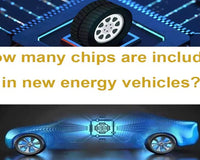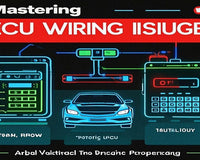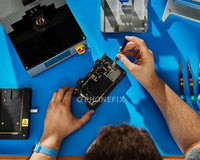Car ECU IC, often considered as the "brain" of a vehicle, holds immense importance in modern automotive. It serves as the digital control center, overseeing various engine functions such as fuel injection, ignition timing, and emissions control. Therefore, selecting the right ECU (Electronic Control Unit) IC chip is crucial for ensuring optimal performance in automotive applications.
Choosing the right ECU IC chip involves careful consideration of various factors, including processing power, memory, I/O capabilities, and applicable scenarios, etc.
Processing Power: The chip's processing speed and architecture (e.g., 8-bit, 16-bit, 32-bit) determine how quickly it can process data from various sensors and execute control algorithms.
Memory: Look for chips with adequate RAM and flash memory to store the necessary software and data. More complex applications may require chips with larger memory capacities.
I/O Capabilities: The number and type of input/output channels are essential for interfacing with sensors and actuators. Ensure the chip can handle the required number of connections for your application.
Engine Control: Chips designed for engine management systems must handle real-time data processing from multiple sensors to optimize fuel injection, ignition timing, and emissions control.
Transmission Control: ECU chips for transmission control units (TCUs) manage gear shifting and optimize performance based on driving conditions.
Safety Systems: Chips used in safety-critical applications (e.g., airbags, ABS) require high reliability and fault tolerance.
The automotive semiconductor market is evolving rapidly. There are many types of ECU ICs on the market. It is difficult to accurately count the exact number, but we know that there are some very critical components.
Microcontrollers IC: These are integral to ECU functionality, combining a CPU, memory, and I/O interfaces on a single chip. The choice of MCU (e.g., 8-bit, 16-bit, 32-bit) affects the processing capabilities and application suitability. For instance, 32-bit MCUs are increasingly used in advanced applications requiring higher computational power.
Digital Signal Controllers (DSPs): DSPs are used for processing complex algorithms in real-time, which is crucial for applications like adaptive cruise control and advanced driver-assistance systems (ADAS).
Power Management ICs: These components manage power distribution and efficiency within the ECU, ensuring that the system operates optimally under varying load conditions. This is particularly important in electric and hybrid vehicles where energy efficiency is paramount.
Sensors: Various sensors (e.g., temperature, pressure, speed) provide critical data to the ECU, enabling it to make informed decisions. The integration of sensors with ECU ICs is vital for enhancing vehicle intelligence and safety features.
Different ECU chips offer varying levels of integration and performance, making them suitable for different automotive applications. Selecting the most suitable ECU IC chip involves understanding your engine's requirements and the specific features needed. Key factors include the number of inputs and outputs, compatibility with engine types (e.g., 4, 6, V8, or V12 cylinders), and the chip's performance capabilities. Consider the chip's architecture, including microcontrollers and processing units, to ensure it meets your project's demands.
How To Choose The Most Suitable ECU IC Chip










